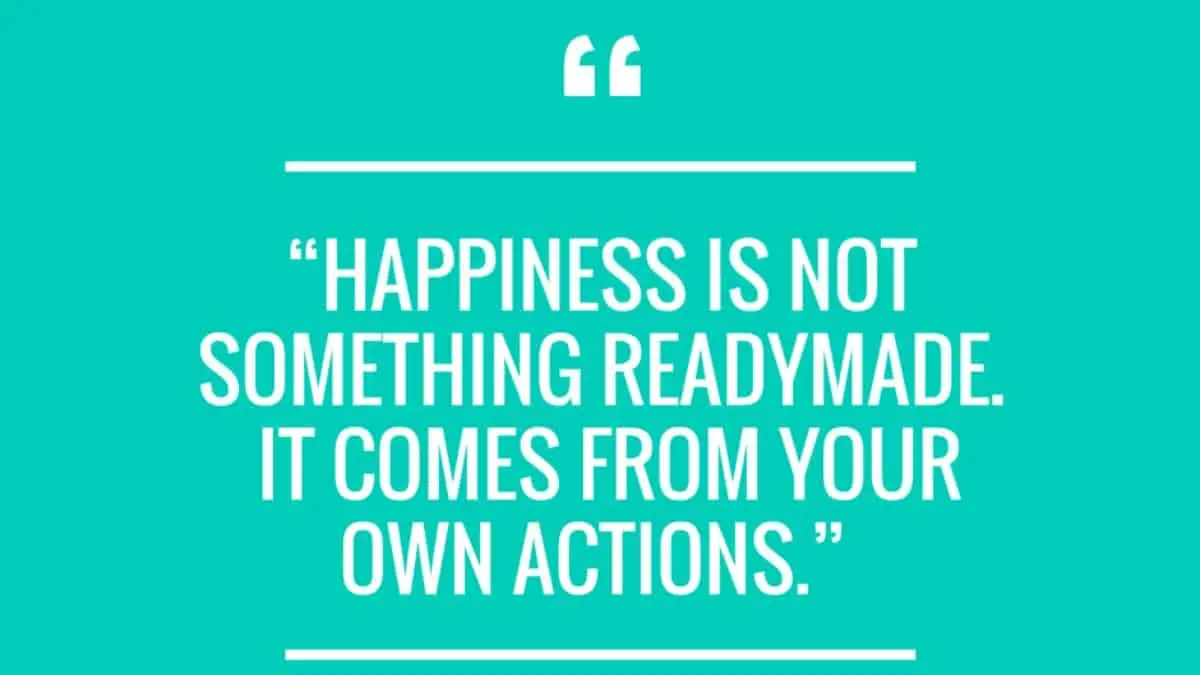In a world that often searches for happiness in material wealth and external validation, the words of the Dalai Lama offer a true meaning of life and happiness: “Happiness is not something readymade. It comes from your own actions.” This quote underscores a powerful truth about personal well-being and happiness—it is not something that can be purchased or passively received. Instead, it is deeply entwined with our actions and the choices we make every day.
Why is this perspective on happiness so significant? In our modern society, it’s easy to fall into the trap of believing that happiness will come from the next big purchase, promotion, or life event. But as the Dalai Lama suggests, true happiness comes from a much more personal and active process. This Blog post will explore what happiness really means, how our actions influence our sense of joy and fulfillment, and what practical steps we can take to cultivate a happier life through our everyday decisions.
Understanding Happiness
Happiness is a concept that has been explored by philosophers, psychologists, and thinkers throughout history, yet its definition remains elusive and subjective. At its core, happiness is a state of well-being and contentment, but the path to achieving it can vary significantly from one person to another. Despite its subjective nature, there are some common threads in the understanding of happiness that can help us approach it more systematically.
The Multifaceted Nature of Happiness
Happiness is not just a momentary feeling of joy or pleasure; it is a complex and enduring state that involves a deep sense of satisfaction and fulfillment in life. It encompasses various aspects, including emotional well-being, life satisfaction, and a sense of meaning and purpose. While moments of joy contribute to happiness, true happiness is more about a sustained and holistic sense of well-being.
External vs. Internal Sources
Traditionally, many people have associated happiness with external achievements and acquisitions, such as wealth, success, and material possessions. This perspective suggests that happiness comes from external sources—something that can be given or taken away by circumstances beyond our control. However, this view is limited and often leads to a never-ending pursuit of more, without ever achieving lasting satisfaction.
The Role of Personal Agency
Contrary to the external perspective, the quote “Happiness is not something readymade. It comes from your own actions” highlights the importance of personal agency in achieving happiness. This approach emphasizes that our daily actions, decisions, and attitudes are central to cultivating happiness. By taking responsibility for our happiness, we acknowledge that our internal state is not solely dependent on external circumstances but can be shaped by our own choices and behaviors.
Happiness as a Dynamic Process
Understanding happiness also involves recognizing that it is not a static state to be achieved and maintained indefinitely. Instead, it is a dynamic process that evolves with our life experiences and personal growth. What makes us happy can change over time as we grow, learn, and encounter new challenges. Thus, happiness is a journey, not a destination, and our actions along the way are what make this journey fulfilling.
Happiness and Personal Actions
The notion that “Happiness is not something readymade. It comes from your own actions,” suggests a proactive approach to achieving personal well-being. This section explores how specific actions can influence our happiness and the mechanisms behind these effects.
Directing Our Actions Towards Happiness
Our daily activities and the choices we make play a crucial role in shaping our overall happiness. Actions that promote happiness are often those that align with our personal values, help us grow as individuals, or connect us with others in meaningful ways. Here are some examples of actions that can lead to a heightened sense of happiness:
- Engaging in meaningful work or hobbies: Whether it’s a career that inspires you or a hobby that excites you, engaging in activities that feel meaningful can boost your sense of purpose and satisfaction.
- Building and maintaining relationships: Social connections are a cornerstone of emotional well-being. Investing time and energy in nurturing positive relationships can significantly enhance your happiness.
- Practicing gratitude: Regularly acknowledging what you are thankful for can shift your focus from what you lack to what you have, fostering a positive mindset and increasing life satisfaction.
- Helping others: Acts of kindness and altruism are not only beneficial for those on the receiving end but also contribute to the giver’s happiness, often referred to as the “helper’s high.”

The Psychological Mechanisms
From a psychological standpoint, engaging in these actions triggers various processes that enhance our happiness:
- Dopamine and serotonin release: Activities that we find rewarding or enjoyable, such as exercising, socializing, or achieving a goal, can trigger the release of happiness-inducing neurotransmitters like dopamine and serotonin.
- Increased sense of control: Taking active steps to improve our situation or to help others can enhance our feeling of control over our lives, reducing feelings of helplessness and boosting self-esteem.
- Cognitive restructuring: By engaging in positive actions, we can gradually shift our thinking patterns from negative to positive, which is a core aspect of cognitive-behavioral therapy known to improve mental health.
Sustainability of Action-Oriented Happiness
While individual actions can provide a boost to our mood, the sustainability of happiness derived from these actions depends on consistency and the integration of these behaviors into our daily lives. Regularly incorporating small, happiness-promoting actions can lead to long-term changes in our overall well-being. It’s also important to recognize that the path to happiness is highly individualized; actions that work well for one person might not be as effective for another, emphasizing the need to find what uniquely works for each individual.
Psychological Perspective
The relationship between our actions and happiness is deeply rooted in psychological theories and research. Understanding this from a psychological perspective can provide insights into why certain behaviors lead to happiness and how we can leverage this knowledge to enhance our well-being.
Positive Psychology
One of the key areas of psychology that examines the link between personal actions and happiness is Positive Psychology. This branch focuses on what makes life most worth living, emphasizing positive experiences, states, and traits. Founded by psychologists like Martin Seligman, Positive Psychology suggests that happiness can be cultivated through deliberate practices such as gratitude exercises, focusing on strengths rather than weaknesses, and nurturing positive relationships.
Self-Determination Theory
Self-Determination Theory (SDT), developed by Edward Deci and Richard Ryan, provides another relevant psychological framework. It posits that human beings have three innate psychological needs: autonomy, competence, and relatedness. When these needs are met, individuals experience enhanced self-motivation and well-being. Personal actions that enhance a sense of autonomy (feeling in control of one’s actions), competence (feeling skilled and capable), and relatedness (feeling connected to others) are therefore crucial for fostering happiness.
Behavioral Activation
In clinical psychology, Behavioral Activation is a treatment approach for depression that underscores the psychological perspective on actions and happiness. It is based on the theory that engaging in enjoyable activities can improve a person’s mood and decrease depressive symptoms. This approach encourages individuals to identify activities that they find rewarding and make a conscious effort to incorporate them into their daily routines, thus reinforcing the idea that our actions can directly influence our mental health and emotional state.
Cognitive-Behavioral Approaches
Cognitive-Behavioral Therapy (CBT) integrates the concept that our thoughts, feelings, and behaviors are interconnected. By changing maladaptive behaviors and thought patterns, we can influence our emotional responses. Personal actions like challenging negative thoughts, practicing mindfulness, and setting personal goals are all CBT strategies that can lead to improved happiness and well-being.
Empirical Evidence
Numerous studies support the connection between actions and happiness. For instance, research has shown that individuals who engage in acts of kindness report increased levels of happiness. Similarly, a study on gratitude, where participants wrote letters of thanks for three weeks, demonstrated significant increases in happiness and life satisfaction. These studies highlight the actionable ways in which individuals can actively influence their happiness.
Conclusion
The idea that “Happiness is not something readymade. It comes from your own actions” is a powerful reminder of the active role we play in shaping our own emotional well-being. Throughout this exploration, we have seen that happiness is not merely the absence of sadness nor something that can be bestowed from external sources. Instead, it emerges from our daily actions and the deliberate choices we make.
Also Read: The journey of a thousand miles begins with one step




